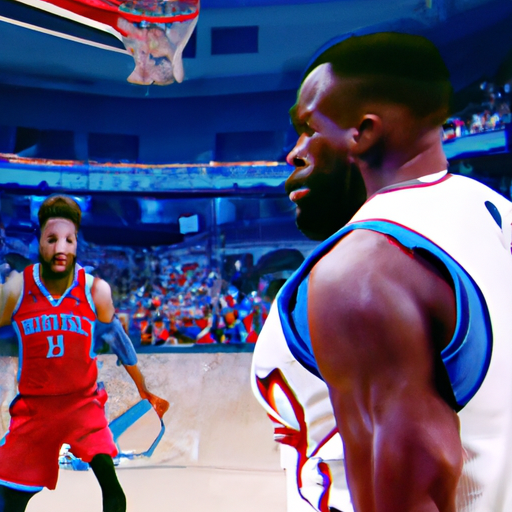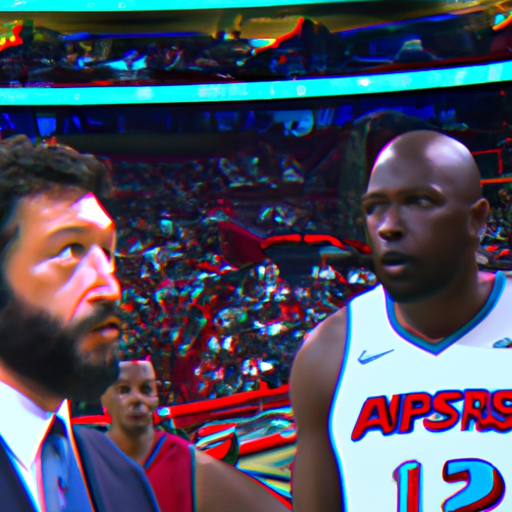Doc Rivers to Patrick Beverley: “If I had you last season, we would’ve been a different team”

The Impact of Doc Rivers on Patrick Beverley’s Performance
Doc Rivers, the head coach of the Los Angeles Clippers, recently made a bold statement about the impact of Patrick Beverley on the team’s performance. He said, “If I had you last season, we would’ve been a different team.” This statement speaks volumes about the influence that Rivers believes Beverley has had on the team and raises the question of how exactly Beverley’s presence has affected the Clippers.
One of the key aspects of Beverley’s game that Rivers values is his defensive prowess. Known for his tenacity and relentless energy on the court, Beverley has established himself as one of the league’s premier defenders. His ability to disrupt opposing offenses and make life difficult for opposing guards has been a game-changer for the Clippers.
Rivers recognizes the importance of defense in winning games and believes that Beverley’s defensive skills have had a significant impact on the team’s overall performance. With Beverley on the court, the Clippers have become a much more formidable defensive unit, capable of shutting down even the most potent offenses. His ability to guard multiple positions and his willingness to do the dirty work have made him an invaluable asset to the team.
In addition to his defensive contributions, Beverley’s leadership and intensity have also played a crucial role in the team’s success. He is known for his vocal presence on the court, constantly communicating with his teammates and providing guidance and motivation. His never-give-up attitude and willingness to sacrifice for the greater good have set the tone for the entire team.
Rivers, who has always emphasized the importance of team chemistry, recognizes the impact that Beverley’s leadership has had on the Clippers. His infectious energy and unwavering commitment to the team’s success have helped create a cohesive and united group that is willing to fight for each other on every possession.
Furthermore, Beverley’s offensive contributions should not be overlooked. While he may not be the team’s primary scoring option, his ability to knock down open shots and make timely plays has been crucial in key moments. His shooting and playmaking abilities have added another dimension to the team’s offense, making them even more difficult to defend.
Rivers understands the value of having a player like Beverley who can contribute on both ends of the court. His versatility and ability to impact the game in multiple ways have made him an invaluable asset to the team.
In conclusion, Doc Rivers’ statement about the impact of Patrick Beverley on the Clippers’ performance speaks volumes about the influence that Beverley has had on the team. His defensive prowess, leadership, and offensive contributions have all played a significant role in the team’s success. Rivers recognizes the importance of Beverley’s presence and believes that if he had him last season, the team would have been a different and more formidable force. As the Clippers continue their quest for a championship, Beverley’s impact will undoubtedly continue to be felt on the court.
How Patrick Beverley’s Role Changed Under Doc Rivers

Doc Rivers, the head coach of the Los Angeles Clippers, recently made a bold statement about his player, Patrick Beverley. He said, “If I had you last season, we would’ve been a different team.” This statement speaks volumes about the impact Beverley has had on the team and how his role has changed under Rivers’ guidance.
When Beverley first joined the Clippers in the 2017-2018 season, he was primarily known for his defensive prowess. His tenacity and relentless energy on the court made him a valuable asset to any team. However, under Rivers’ coaching, Beverley’s role has expanded beyond just defense.
Rivers recognized Beverley’s potential as a leader and playmaker. He saw that Beverley had the ability to not only shut down opponents on defense but also contribute on the offensive end. Rivers worked closely with Beverley to develop his offensive skills and improve his decision-making on the court.
One of the ways Rivers helped Beverley expand his role was by giving him more ball-handling responsibilities. In the past, Beverley was mainly used as a spot-up shooter or a cutter off the ball. However, Rivers saw that Beverley had the ability to create plays for himself and his teammates. He encouraged Beverley to be more aggressive in driving to the basket and making plays for others.
Another aspect of Beverley’s game that Rivers focused on was his three-point shooting. Rivers knew that in today’s NBA, having players who can stretch the floor and knock down threes is crucial. He worked with Beverley on his shooting mechanics and encouraged him to take more shots from beyond the arc. As a result, Beverley’s three-point shooting percentage has improved significantly under Rivers’ guidance.
Rivers also emphasized the importance of Beverley’s leadership on the team. He recognized that Beverley’s intensity and passion for the game were contagious and could inspire his teammates. Rivers encouraged Beverley to be vocal on the court, to communicate with his teammates, and to lead by example. Beverley embraced this role and became a vocal leader for the Clippers, motivating his teammates and holding them accountable.
Under Rivers’ coaching, Beverley’s role has evolved from being just a defensive specialist to a well-rounded player who can contribute on both ends of the court. His improved offensive skills, three-point shooting, and leadership have made him an invaluable asset to the team.
Rivers’ statement about how the team would have been different with Beverley last season is a testament to the impact he has had on the Clippers. Beverley’s expanded role and improved skills have undoubtedly made a difference in the team’s performance.
In conclusion, Patrick Beverley’s role has changed significantly under Doc Rivers’ coaching. Rivers recognized Beverley’s potential as a leader and playmaker and worked closely with him to develop his offensive skills. Beverley’s expanded role as a ball-handler, improved three-point shooting, and leadership have made him an integral part of the Clippers’ success. Rivers’ statement about how the team would have been different with Beverley last season speaks volumes about the impact he has had on the team.
The Importance of Coaching Chemistry: Doc Rivers and Patrick Beverley
Doc Rivers, the head coach of the Los Angeles Clippers, recently made a bold statement about one of his players, Patrick Beverley. He said, “If I had you last season, we would’ve been a different team.” This statement speaks volumes about the importance of coaching chemistry and the impact it can have on a team’s success.
Coaching chemistry is the dynamic relationship between a coach and their players. It goes beyond X’s and O’s and delves into the realm of trust, communication, and understanding. When a coach and player have a strong chemistry, it can lead to a more cohesive team, better performance on the court, and ultimately, more wins.
In the case of Doc Rivers and Patrick Beverley, their chemistry is evident. Rivers, known for his ability to connect with his players, has found a kindred spirit in Beverley. The two share a similar passion for the game and a relentless work ethic. This shared mindset has allowed them to develop a strong bond, both on and off the court.
One of the key aspects of coaching chemistry is trust. A coach needs to trust their players to execute their game plan and make the right decisions on the court. Likewise, players need to trust their coach’s guidance and believe in their strategies. This trust is built over time through open communication and a mutual understanding of each other’s roles and expectations.
Rivers and Beverley have undoubtedly built this trust. Rivers has praised Beverley for his defensive prowess and his ability to disrupt opponents’ offenses. Beverley, in turn, has embraced Rivers’ coaching style and has become a vocal leader on the court, rallying his teammates and setting the tone for the team’s defensive intensity.
Communication is another crucial element of coaching chemistry. A coach needs to effectively communicate their expectations, strategies, and feedback to their players. Likewise, players need to be able to communicate their thoughts, concerns, and ideas to their coach. This open line of communication fosters a collaborative environment where everyone’s input is valued.
Rivers and Beverley have mastered this aspect of coaching chemistry. They have developed a strong rapport that allows them to have honest and constructive conversations. Beverley has spoken about how Rivers’ communication style has helped him grow as a player and how he appreciates the coach’s willingness to listen to his ideas and feedback.
The impact of coaching chemistry on a team’s success cannot be overstated. When a coach and player are on the same page, it creates a sense of unity and purpose within the team. Players are more likely to buy into the coach’s system and give their all on the court. This cohesion can lead to improved performance, better teamwork, and ultimately, more wins.
In the case of Doc Rivers and Patrick Beverley, their coaching chemistry has undoubtedly made a difference for the Los Angeles Clippers. Rivers’ statement about how Beverley could have changed the team’s fortunes last season speaks volumes about the impact their relationship has had. It serves as a reminder of the importance of coaching chemistry and the profound effect it can have on a team’s success.
In conclusion, coaching chemistry is a vital component of a team’s success. The relationship between a coach and player can greatly influence the team’s performance on the court. Doc Rivers and Patrick Beverley serve as a prime example of the power of coaching chemistry. Their trust, communication, and shared passion for the game have transformed the Los Angeles Clippers into a formidable team. As other teams look to replicate their success, they would be wise to prioritize building strong coaching chemistry within their own organizations.

